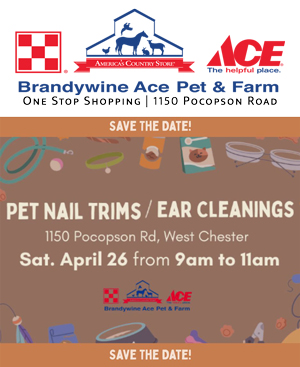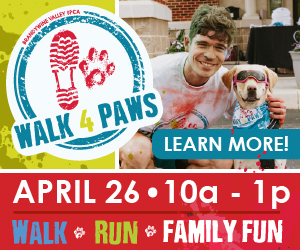By Janet McGann, Special to The Times
 Last Monday, Unionville High School had a Narcotics Overdose Prevention and Education assembly regarding the deaths caused by overdosing on drugs — part of an ongoing program of such assemblies held around the county.
Last Monday, Unionville High School had a Narcotics Overdose Prevention and Education assembly regarding the deaths caused by overdosing on drugs — part of an ongoing program of such assemblies held around the county.
Unfortunately, while the intentions of the assembly were good, the information and tactics used were ineffective on the student body.
Before starting, my sentiments go out to the parents and families of those that have died from overdosing. I appreciate the work that goes into these assemblies,’ but I feel as if these parents are trying to help but, not doing so effectively. I would like N.O.P.E to use tactics and information that reach their target audience. They focused on outdated information and fear tactics that only worked on the small part of the student body that doesn’t use drugs.
This assembly did not focus on Juuling, the heroin epidemic, binge drinking/drugs at parties, legal implications (DUI,DWI), or the addiction caused by doctors over-prescribing opiates for athletic injuries. These affect a large portion of the student body and it is information that the students need to know. It did not focus on statistics or the current increase in drug overdoses in Pennsylvania.
“In 2016, 4,642 drug-related overdose deaths were reported by Pennsylvania coroners and medical examiners, an increase of 37 percent from 2015. In 2016 approximately 13 people died of a drug-related overdose each day”(PittPharmacy, 2016)
Most high schoolers know that weed isn’t addictive and that the “gateway” method is fully incorrect. They don’t know how weed affects the brain — especially brains under age 25 — or how damaging nicotine addiction is. They don’t know how prescribed medicine can lead to an addiction. High schoolers know that heroin and weed don’t belong in the same category: in the case of the former, one dose can kill.
“An alternative to the gateway-drug hypothesis is that people who are more vulnerable to drug-taking are simply more likely to start with readily available substances such as marijuana, tobacco, or alcohol, and their subsequent social interactions with others who use drugs increases their chances of trying other drugs.” (Drugabuse.gov)
To start, students walked into the auditorium to see portraits of those who have overdosed on drugs. They paid respects to the dead but they gave them each the same story — dehumanizing them, unfortunately — making them seem like perfect model students, each being charismatic and kind and having their parents either be too passive or not know about their life-ending addiction.
Then, to end each story they fault their friends for not being better people for not calling the police sooner, followed by calling the student body out and saying that we could be “heroes” if we called out our friend’s drug addiction.
At the end, and to scare, it seems, they had a police officer speak and pull out an urn — granted, better than last year’s body bag — and talk about how that’s all families have left of their dead children.
Obviously, this was an incredibly depressing assembly. It used fear mongering to try to scare students into thinking all drugs are equally bad and perfect and smart kids will still die.
I think N.O.P.E underestimates the knowledge that the modern high school kids have about drugs. There was storytelling and the whole assembly felt like a drug themed SPCA commercial but all the student body took away from it is that drugs=death and that the EMS probably won’t be able to revive your overdosed dead body.
For an assembly that focused on overdosing, they did not go over the signs of overdose or drug use very well, in essence, they just said “call the police and hope for the best.”
In the end, I think that N.O.P.E is a great program and the people behind it try their best to help students around the nation — but their methods are outdated and their tactics are poorly executed.
Janet McGann is a resident of Pocopson and a junior at Unionville High School. She is the daughter of Times’ editor Mike McGann and plans to study music education in college.
Citations:
Philadelphia division , DEA, and University Of Pittsburg. “Analysis of Overdose Deaths in Pennsylvania, 2016.” OverdosefreePa, PittPharmacy, July 2017, www.overdosefreepa.pitt.edu/wp-content/uploads/2017/07/DEA-Analysis-of-Overdose-Deaths-in-Pennsylvania-2016.pd_-1.pdf.
National Institute on Drug Abuse. “Is Marijuana a Gateway Drug?” NIDA, Feb. 2018, www.drugabuse.gov/publications/research-reports/marijuana/marijuana-gateway-drug.








Janet, I just heard about your article and read it carefully. I am sorry you were so dissatisfied with the program. I can tell you how NOPE has been effective. We have received much feedback from students. Some have turned in dealers from their schools, asked for help with friends and loved ones and even went into treatment.
We do speak about how alcohol affects our brains and that we do make bad decisions while intoxicated like taking a pill. Weed is a gateway drug as in your I.Q goes down, motivation decreases, the behaviors that come with stealing and sneaking to get high are behaviors that lead to doing other drugs.
We do share how you can get into the legal system by the girl who brought pills to a dance, gave them out to students in which two died. She is serving 25 years for manslaughter.
We teach that when you are hurt in a sport that its illegal to share medication that aren’t prescribed to you.
The visuals we share especially the two questions we ask…stand if you know someone to which almost all the student body remains standing…remain standing if you got help for a person where some remain standing and we call them hero’s.
How 2 + 2 can equal 10, 20 as we do not know how mixing and combining will affect our bodies and overdose on a small amount.
Teens psychologically are working on emotions which is why we “go there” sharing personal stories.
You saying we dehumanize and comparing us to the SPCA is offensive. Calling us a scare tactic is immature of you as kids see worse on a t.v. commercial.
I do not understand how you didn’t understand all that.
You can go to NIDA, National Institute of Drug Abuse. I suggest you read and watch Dr. Nora Volkow and educate yourself a little further.
Please reach out to NOPE Headquarters with your comments and concerns. We are happy to hear what you have to share. NOPEHQ@gmail.com
While I think a good portion of your insights are well thought out one thing you do need to consider is that all drugs ARE equally bad when not used as prescribed or are street drugs and perfect and smart kids WILL still die. Also being addicted to drugs does equal death if you don’t get help.
I think it would have been best to maybe speak with the presenters of the NOPE program and get their side of things before taking them to task in your article, because many like you have all the facts, but lack the sense to utilize those facts and stay away from drugs period.
Janet, as a parent who worked has with kids with drug addictions for many years I appreciate your comments and thoughts and think they are so accurate. I hope these are shared with the presenters and the school faculty as this is such an important topic as opiate overdoses and deaths are a huge problem in Canada as well as the USA. Excellent article.
Janet, I think your comments were spot on and who better to speak of what would affect the students better than a student. Have you shared your concerns with HOPE? We parents tend to get stuck in a period of time, where are kids were, then….. Your insight, I believe, would be very beneficial to the speakers. Their hearts are broken. They don’t want to see any other child die as their own did. The pain is so great that maybe they cannot see past the period of time when they were devastated by their loss. Please reach out to them and share your thoughts.
Thank you for your excellent reporting. My son is a sophomore at UHS and would not give me this level of detail. I now have a basis for discussing this at home with him.